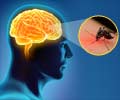Highlights
- Anti-NMDA receptor encephalitis is a rare form of encephalitis which affects the central nervous system.
- Standard treatments for the rare form of encephalitis were found to be ineffective.
- Bortezomib drug is a new treatment option for Anti-NMDA receptor encephalitis.
Standard treatment for the rare form of Anti-NMDA receptor encephalitis is ineffective.
Dr. Franziska Scheibe and Prof. Dr. Andreas Meisel from the Department of Neurology and the NeuroCure Cluster of Excellence, Charite-based researchers, were found to record the outcomes of encephalitis patients using new treatment regimen.
Bortezomib drug is a proteasome inhibitor which is found to be successful in the treatment of patients with a specific type of blood cancer called plasmacytoma.
Proteasomes are important for the degradation of proteins that are required to regulate the cell cycle, thereby regulating cell growth.
The research study conducted on five patients were able to show that bortezomib treatment quickly led to clinical improvements among patients with severe form of encephalitis. It was also found to decline the antibodies that were responsible for the disease.
The author also said, that further studies may focus on developing new biomarkers that may help to predict patients with severe form of encephalitis and allow physicians to initiate treatments.
Andreas Meisel, said, "As is the case with all other treatments currently used in patients with this disease, our results need to be confirmed by randomized trials."
Anti-NMDA Encephalitis
It is a serious autoimmune disease characterized by brain inflammation that results in neurological and psychiatric symptoms. Anti-NMDA encephalitis mostly occurs in children and young adults. Females are more likely to be affected than males.
Symptoms of Anti-NMDA Encephalitis
- Flu symptoms
- Loss of consciousness
- Seizures
- Memory problems
- Mood disorders
- Behavioral problems
- Sleep disorders
It is an anti-neoplastic drug that is used in the treatment of cancers in the bone marrow and other cancers in the immune system. Bortezomib drug comes in the form of a solution to be injected into the vein.
References
- Franziska Scheibe, Harald Prüss, Annerose M. Mengel, Siegfried Kohler, Astrid Nümann, Martin Köhnlein, Klemens Ruprecht, Tobias Alexander, Falk Hiepe, Andreas Meisel. Bortezomib for treatment of therapy-refractory anti-NMDA receptor encephalitis. Neurology, 2016; DOI: 10.1212/WNL.0000000000003536
- What is Anti-NMDA Receptor Encephalitis? - (http://www.antinmdafoundation.org/the-illness/what-is-anti-nmda-receptor-encephalitis/)
- Bortezomib - (https://medlineplus.gov/druginfo/meds/a607007.html)
Source-Medindia













